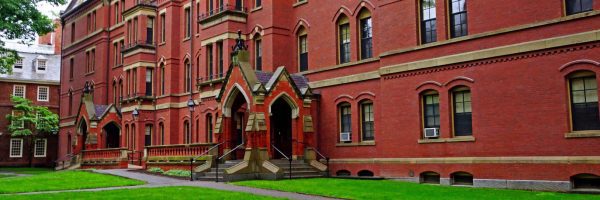Which Business School Students Have the Top GMAT Scores?

A strong GMAT score is essential to a stellar business school application. Though the score is universally important to admission, certain schools emphasize a high score on the test more than others. Below, we’ve laid out a list of the 10 business schools with the top GMAT scores for incoming students.
Where Have All the New Ideas Gone? – Boston News

Let’s explore some of the most interesting stories that have emerged from Boston business schools this week.
New Ideas are Getting Harder to Find—and More Expensive – MIT Sloan Newsroom
MIT Sloan recently examined just how difficult is it to come up with new ideas in an age of seemingly infinite access.
A new National Bureau of Economic Research study published by MIT Sloan Professor of Applied Economics John Van Reenen, Stanford University professors Nicholas Bloom and Charles I. Jones, and Stanford Doctoral candidate Michael Webb finds that “the productivity of scientific research is falling sharply across the board” due in large part because “researchers are putting in more and more effort to sustain the same—or even a slightly lower—pace of idea generation as we experienced half a century ago.”
Van Reenen writes, “As the total amount of knowledge becomes larger and larger and larger, it becomes increasingly difficult to get to its frontier of that knowledge. It was much easier a couple thousand years ago.”
Two workarounds are to narrow the “focus of one’s studies to specialize in a very particular domain” and expand investment into research. However, both solutions arrive with their own sets of challenges, according to Van Reenan.
“In order to carry on innovating, you’re constantly working together, and it’s very complicated to get all of these people and ideas together.”
Van Reenan is concerned that government investment into scientific research is simply not enough of a high priority.
“I think a lot of the time you hear we’ll just cut the top tax rates to generate lots of innovation — I’m pretty skeptical about that in terms of the incentives you’re going to give. Both have positive effects on growth and equality. Instead of giving away $5 trillion in tax cuts, use that to invest in growth opportunities for the future.”
You can read the full article from MIT Sloan here.
No More General Tso’s? A Threat to ‘Knowledge Recombination’ – Harvard Business Week
HBS Technology and Operations Management Unit Assistant Professor Prithwiraj “Raj” Choudhury is set to publish a new Strategic Management Journal paper that explores the “role ethnic migrants play within the work force,” as well as the “new technologies in countries where they’ve migrated.”
Choudhury points to examples throughout history like Soviet mathematicians who “came to the United States in the 1990s after the fall of the Soviet Union; far ahead in fields like partial differential equations and symplectic topology, they helped their American counterparts solve otherwise intractable problems,” American Chinese cuisine staples like General Tso’s chicken and chop suey, and Indian immigrants who brought double-entry bookkeeping to South Africa in the late 19th century.
Choudhury uses ‘The Ethnic Migrant Inventor Effect: Codification and Recombination of Knowledge Across Borders,’ written with HBS doctoral student Do Yoon Kim, as a launch pad to discuss immigration through the lens of knowledge production rather than job creation—or absorption.
“Instead of seeing migrants through the lens of whether they create jobs or not, we should view migrants as carriers of knowledge—knowledge that could be further recombined by locals. If H1-B was scrapped, or Europe stopped admitting skilled migrants, the knowledge production of the global economy would suffer.”
Choudhury adds, “It’s not only a loss to the firms, it’s also a loss to local workers, who will lose out if they do not imbibe this knowledge from migrants. I would turn the debate on its head and say, it’s not about destroying or creating jobs, it’s about participating in or losing out on creating knowledge.”
You can read the full article here.
Coffee Break – Sawyer Business School
MassChallenge, the self-described “most friendly start-up accelerator on the planet” recently selected WarmUp Protein Coffee, a “coffee-cum-protein beverage” developed by Sawyer Business School alum James Testa (BSBA ’17) as part of Sawyer’s “Crowdfunding the Venture” class.
Testa writes about how getting rejected from last year’s competition sent him back to the drawing board and enabled WarmUp to stand out among the other 1,600 applications. In a recent interview with his alma mater, Testa says:
“I spent all year getting the product out there, building the business, and getting some sales. So when I went back to MassChallenge this year, I feel like I had a much better grasp of my business and who my customers were. And because I had real sales, I was a lot more confident about it. The proof of concept was already there.”
MassChallenge start-ups “get free office space, connections to industry-specific mentors, advice from venture capitalists, and the chance to win up to $1.5 million to help launch a business.”
You can read the full article here.
Religious Spending, Taking Risks, and More – Boston News

Let’s explore some of the most interesting stories that have emerged from Boston business schools this week.
Shoppers with Strong Religious Beliefs Spend Less and Make Fewer Impulse Purchases – Harvard Business Review
The Harvard Business School recently published an article in the Harvard Business Review that illuminates a fascinating correlation between grocery spending and religiosity—as the latter rises, the former falls.
The researchers write, “We found that for each 20 percent increase in the number of religious adherents in a county, annual grocery sales per store decreases, on average, by about $125,000. [Our] results showed that shoppers living in more religious U.S. counties spent less money on groceries and also made fewer impulse purchases than those living in less religious U.S. counties.”
The implications of the research are vast and wide reaching, particularly for retailers. They explain further:
“Because being reminded about God increases shoppers’ frugality, they may be more sensitive to price discounts and promotions (such as “buy one, get one free”) around the time of religious holidays and observances. Getting a good deal, particularly on an impulse buy, is likely to alleviate shoppers’ heightened frugality.”
The researchers also speculate that “retailers may also allay religious shoppers’ concerns about being frugal by offering deals that demonstrate respect for their values, such as promising to donate a percentage of revenue from a particular product to a local charity.”
You can check out the full article here.
When Regulation Doesn’t Throttle Risk-Taking – Questrom School of Business Blog
New Management Science research from Questrom School of Business Accounting Professor Ana Albuquerque and Fudan University’s Julie Lei Zhu finds the positive impacts of the 2002 Sarbanes-Oxley Act (SOX), which required companies to implement internal controls on financial reporting.
According to the article, “not only did filing firms not decrease their investment activities, some measures suggested that firms actually increased their investments after the reporting requirements were put into place. Filing firms also appeared to benefit in other ways. Banks typically offered filing firms larger loans with lower collateral requirements compared to non-filing firms.”
Albuquerque writes, “Credit terms improved [for filing firms], because they were disclosing more information. The benefit was higher than the cost of compliance.”
You can read more here.
These 12 startups are Re-Imagining the Latin American Workplace and Workforce – MIT Sloan Newsroom
MIT Sloan recently announced the 12 Latin American finalists of the its global Inclusive Innovation Challenge, all of which will travel to São Paulo, Brazil in just a few weeks “where they will pitch their ideas at the IIC Latin America Celebration.”
According to the article, “the winner of each category then goes on to compete in November during the Global Grand Prize Gala at MIT. The gala includes four $250,000 prizes, one for each category.”
Initiative Director Erik Brynjolfsson writes, “If we employ inclusive innovation globally, it could be the best thing that ever happened to humanity. We can have more wealth, better health, and widely held prosperity.”
Here’s a quick overview of each of the 12 Latin American finalists:
- Interacpedia “connects university student teams with organizations to generate the development of new skills/jobs and opportunities.”
- Signa is a “platform that provides deaf people with online digital economy courses.”
- Sumá is a “fair marketing platform that connects family farmers with food buyers.”
- Alò Bodega is a “mobile app for Latin American and Asian corner stores.”
- Apli is an “artificial intelligence-enabled jobs marketplace.”
- Incluyeme is an “online job portal for people in Latin America with disabilities.”
- Grupo Nueva Economía is “developing new digital channels for small businesses and entrepreneurs.”
- Outbound Initiative “connects innovators from underrepresented regions — in this case Brazil — with business opportunities using data-combing artificial intelligence.”
- RedeDots is a “social network of more than 220,000 people engaged in the fair trade and sustainable business market.”
- LEVEE “uses machine learning, geolocation, and mobile messages to connect people with job opportunities.”
- Trocafone “aims to reduce e-waste by creating a marketplace for used electronics.”
- UnDosTres “offers Mexico residents mobile payment for services like prepaid cellphone recharging, movie ticket purchases, electricity, and phone bills.”
You can read more about the startups here.
Fighting Fake News, Working Mothers, and More – Boston News

Let’s explore some of the most interesting stories that have emerged from Boston business schools this week.
Lazy Thinking, Not Political Bias, Drives Fake News – MIT Sloan Newsroom
MIT Sloan Associate Professor David Rand and the University of Regina’s Gordon Pennycook recently published a new study that illuminates what actually perpetuates fake news—a “lack of analytical thinking.”
Professor Rand writes, “Our study suggests that falling for fake news is a symptom of cognitive laziness rather than motivated reasoning or self-deception. That is, contrary to popular belief, it is not the case that people are thinking too much about the wrong things. Rather, a little thinking might go a long way to fix the problem of fake news.”
In a study that surveyed “3,446 participants to rate the accuracy of headlines from actual news stories from Facebook,” the duo found that “people who engage in more analytic thinking, as measured by the Cognitive Reflection Test, are better at discerning true from false—regardless of identified motivations or political biases.”
You can read more about the research here.
What’s Your Carbon Footprint? You Probably Have No Idea. – D’Amore-McKim Blog
In a recently published study, D’Amore-McKim Professor Amir Grinstein surveyed 1,000 people to “guess the amount of CO2 emitted from burning one gallon of gasoline and the amount of calories in one gallon of whole milk.”
The goal was to “examine people’s knowledge of their own carbon footprint and how they can better educate themselves about the real impact they have on the environment.”
Grinstein believes that in order to change the public’s understanding of its own carbon footprints, they must have a “better understanding of how CO2 emissions play a role in everyday life allows people to decide if they’re willing to step up and change.”
Check out the full article here.
Kids of Working Moms Grow Into Happy Adults – Working Knowledge
New research from Harvard Business School Professor Kathleen McGinn found that, despite the narrative, working mothers often lead to happier and more successful children.
McGinn, the Cahners-Rabb Professor of Business Administration, says, “People still have this belief that when moms are employed, it’s somehow detrimental to their children. So our finding that maternal employment doesn’t affect kids’ happiness in adulthood is really important.”
The preliminary results of McGinn’s work were originally published three years ago, specifically regarding the career success of daughters of working mothers, in contrast to stay-at-home mothers.. When the story reached The New York Times, however, there was some obvious blow-back. McGinn recalls:
“Many decried the research as another installment of the ‘mommy wars.’ But the most common response was from mothers who suffered guilt, self-doubt, and disapproval from others. They found our preliminary results to be welcome news.”
However, McGinn’s research, which was conducted alongside Mayra Ruiz Castro of Kingston University in the UK, and Elizabeth Long Lingo of Worcester Polytechnic Institute, found that the careers of sons of working mothers were not generally effected. Rather, their attitudes were different in contrast to stay-at-home-mothers.
“Sons are influenced in other ways when their moms work. The sons of employed mothers hold significantly more egalitarian gender attitudes—even more so than the daughters of stay-at-home moms, a finding that surprised McGinn because it shows that the influence of maternal employment may even outweigh well-documented sex differences when it comes to shaping people’s mindsets about appropriate roles for men and women.”
You can read more of the ground-breaking research here.
10 Highest GPA Averages in the Business School World

The role of a GPA in MBA admissions is a hotly debated topic among both admissions officers and applicants. How much does it really matter? Does a low GPA destroy your chances of getting into a top business school?
One of the most important things to keep in mind when considering how your undergraduate GPA will impact the MBA admissions process is the fact that not all GPAs are alike. Far from a standardized figure, GPA and the way it’s measured can vary from school to school- even major to major. For this reason, it can be difficult to use the GPA’s of different applicants as any accurate predictor of success.
An student’s GPA will always be an important part of the admissions process, because it helps tell admissions officers about past academic success. Still, admissions officers are well aware of the high level of variability between GPA scores. Taking this into account, most officers working in MBA admissions will always look for more to an individual’s story than just the GPA. Numbers like a GMAT/GRE can often paint a much more exact picture of future academic success than the highly variable GPA. Designed for standardization and to test individuals on the specific challenges of an MBA, a GMAT score allows admissions officials specific insight into each application.
When considering GPA, a general rule of thumb is to not ride or die by this number—whether for better or for worse. A low undergraduate GPA doesn’t necessarily spell disaster for one’s MBA ambitions, and even a perfect 4.0 can’t save an application if the other factors don’t add up.
Overall, the exact number of an undergraduate GPA may be less important than the story behind it. If your low GPA was a result of illness or another external factor while in school, personal statements on the application are a great opportunity to give context behind the numbers and help tell your story to admissions officials.
YOU MAY ALSO LIKE: The Highest Paying MBA Internships You Can Find
Nevertheless, getting a sense of the average undergraduate GPA for your prospective programs can help give provide crucial insights. Class profiles and statistics for business schools throughout the country can give prospective students a good sense of the typical student looks like in each program, and help applicants decide if they’ll be a good fit.
Below, we take a look at the top 10 MBA programs with the highest average undergrad GPA. Take a closer look at these top schools to get an idea of the average student in each program- and your potential future classmates.
10 Highest GPA Averages for MBAs
1. Stanford University Graduate School of Business
The highest GPA average for MBA students in the U.S. belongs to the class at the Stanford University Graduate School of Business. For the Class of 2019, the average undergrad GPA was 3.74. This is down slightly from the school’s 2015 average of 3.75.
2. Harvard Business School
Often jockeying for position with Stanford, HBS took the number two spot this year with an average undergrad GPA score of 3.71. Three years ago, HBS still loomed large with a 3.66 average, and it just keeps getting higher.
3. Haas School of Business – UC Berkeley
Staying on the heels of Harvard, the Haas School of Business at UC Berkeley takes a top spot today with an undergraduate GPA of 3.7. This is a slight increase from the school’s 2015 average of 3.66.

The Haas School of Business GPA average for MBA applicants rose from 3.66 to 3.7 since 2015.
4. Yale School of Management
Significantly up from its GPA average of 3.6 in 2015, the Yale School of Management today has one of the highest undergraduate GPAs in the country at an average of 3.69.
5. Booth School of Business – University of Chicago
The MBA at University of Chicago’s Booth School of Business has consistently maintained one of the top GPA averages for programs in the U.S., up from 3.59 in 2015 to 3.6 this year.
6. The Wharton School – University of Pennsylvania
The Wharton School, consistently recognized for having some of the country’s top business programs, is nothing if not consistent. With a 3.6 average for incoming students between 2012 and 2015, Wharton maintains a perfect 3.6 average GPA this year as well.
7. Kellogg School of Management – Northwestern University
Northwestern’s Kellogg School of Management is another school where consistency is key. From 2014 to today the school has remained at an undergraduate GPA average of 3.6

The average Kellogg undergraduate GPA for MBA students has stayed at 3.6 since 2014.
8. Tuck School of Business – Dartmouth College
The average GPA for incoming students at Dartmouth’s Tuck School of Business has gone up and down throughout the years, but has consistently stayed among the highest in the country- down slightly from 3.52 in 2015 to 3.51 this year.
9. Columbia University – Columbia Business School
The Columbia Business School has always received distinctions as one of the top MBA programs in the country, and their average GPA for incoming students at 3.5—which has stayed the same for more than five years—is no exception.
10. MIT – Sloan School of Management
Typically placing much higher on the list, the average Sloan School of Management at MIT has decreased in recent years, from 3.54 in 2015 to 3.49 for this year’s incoming class. The number nonetheless still remains among the highest average GPAs for MBA programs throughout the country.
Managing a Personal Crisis, and More – Boston News

What’s going on in Boston this week?
How to Manage an Employee Who’s Having a Personal Crisis – Harvard Business Review
The Harvard Business Review recently explored how managers can best support employees to “take care of themselves emotionally while also making sure they are doing their work.”
Annie McKee, author of How to Be Happy at Work and a senior fellow at Penn’s Graduate School of Education, offers three helpful suggestions:
- Set a tone of compassion in the office. It will not only give your employees confidence to approach you with struggles, but also give you the ability to spot warnings signs.
- Be creative with solutions. A flexible schedule may allow a person to maintain their output without much disruption.
- Check in from time to time, both to reassure the employee and to make sure that further adjustments or accommodations aren’t needed.
You can read the full article over at HBR.
Agile at Scale, Explained – MIT Sloan Newsroom
MIT Center for Information Systems Research’s Kristine Dery is currently studying how agile management—the increasingly popular management methodology adopted by the likes of Microsoft, Ericsson, and Spotify—relates to the employee experience.
MIT Sloan School of Management senior lecturer and industry liaison Carine Simon writes, “The traditional method of managing, the waterfall method, which is very inflexible, planned-in-advance, linear, and not iterative at all, wasn’t lending itself at all to the flexibility and the adjustments that were necessary to make great software.”
Simon adds, “[Agile is] iterating with customer feedback, prototypes, and tests, versus taking some requirements and issuing the product maybe a year later, when the customer’s requirements have changed or technology has evolved.”
Many companies have taken note of agile’s prevalence and begun to “ask whether the method’s practices and philosophies could be scaled up to apply with equal success to other projects or even entire business functions,” according to Simon and Dery.
Simon continues, “In customer-centric processes where customer input is key, and in that sense it’s quite uncertain or fast-changing, then those would be the types of areas in a firm that lend themselves to agile.”
Check out the full article here.
Questrom Professor Named 2018-19 Batten Fellow – Questrom Blog
BU Questrom School of Business‘ Siobhan O’Mahony was recently awarded a 2018-19 Batten Fellowship by the Batten Institute for Entrepreneurship and Innovation at University of Virginia Darden School of Business.
The Batten Fellows program, according to Darden, “provides support for prominent thought leaders and high-potential scholars who seek to generate new knowledge about entrepreneurship and innovation.”
O’Mahony, an Associate Professor of Strategy & Innovation and Academic Director of Research and Curriculum for Innovate@BU, explores how “technical and creative projects organize for innovation.”
O’Mahony plans to use her fellowship to “research entrepreneurial ecosystems and how those systems influence entrepreneurs and their efforts around venture creation.”
Read all about O’Mahony’s fellowship as part of the full article here.
